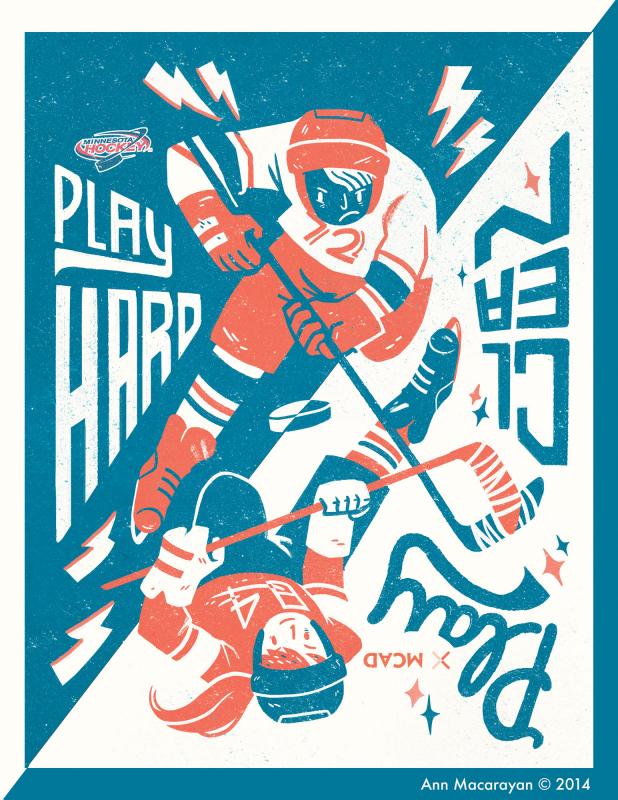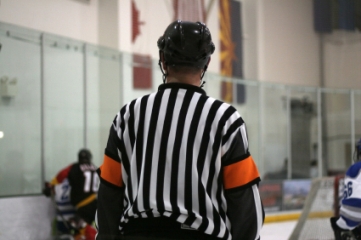More stringent penalties for boarding and checking from behind in high school ice hockey have been approved for the 2014-15 season.
In its ongoing attempt to minimize the risk of injury in hockey, Ice Hockey Rules Committee of the National Federation of State High School Associations (NFHS) voted at its April 2014 meeting to make the penalties for violating the rules against boarding (Rule 6-4-1) and checking from behind (Rule 6-7-1) automatic majors. Their recommendations were subsequently approved by the NFHS Board of Directors. 
Previously, only a flagrant violation of the boarding rule ( "No player shall check, cross-check, elbow, charge or trip an opponent in such a manner that causes the opponent to be thrown violently into the boards") prompted a major penalty.
Flagrant violations, or checks which cause the player to crash head first into the boards, must now result in either a major and misconduct penalty, or game disqualification.
"Increasing the first level of penalty for boarding should act as a deterrent when combined with proper teaching and education," said Dan Schuster, NFHS staff liaison to the committee, who also serves as NFHS assistant director of coach education.
"Boarding is one of the most dangerous plays in the sport, and a flagrant boarding act can carry severe consequences to participants and must be accompanied with stiff penalties."
Equally dangerous is the act of checking from behind. Violation of Rule 6-7-1, which states "No player shall push, charge, cross-check or body-check an opponent from behind in open ice," will now automatically result in a major penalty instead of a minor and misconduct.
Schuster said that, by increasing the penalties for boarding and checking from behind, the committee wanted to make it clear that this type of dangerous play has no place in high school ice hockey.
 "The NFHS Ice Hockey Rules Committee continues in its belief that the main threat to the health of high school ice hockey is violent and reckless play," said Tom Shafranski, assistant director of the Wisconsin Interscholastic Athletic Association and chair of the NFHS Ice Hockey Rules Committee. "The safety and well-being of the participants is paramount and the primary focus of this committee."
"The NFHS Ice Hockey Rules Committee continues in its belief that the main threat to the health of high school ice hockey is violent and reckless play," said Tom Shafranski, assistant director of the Wisconsin Interscholastic Athletic Association and chair of the NFHS Ice Hockey Rules Committee. "The safety and well-being of the participants is paramount and the primary focus of this committee."
Among the points of emphasis formulated by the committee for the coming season are player safety/dangerous hits, concussion recognition and management, proper communication to eliminate unsportsmanlike conduct and taunting, and proper equipment.
The NFHS rule changes come two years after Minnesota Hockey stiffened the penalties, at which time it encouraged the Federation to follow suit, noted Hal Tearse, a MomsTEAM blogger and longtime ice hockey official and safety advocate and former Official-in-Chief of Minnesota Hockey. "They declined a year ago but apparently felt the pressure to change."
Enforcement is challenge
The challenge, however, as Tearse has noted, is actually getting hockey referees to enforce such rules.
" It's a good thing, if they enforce the rules, but they won't most of the time," worries Tearse. As a result, he fears that concussions and even catastrophic injuries will continue at an unacceptable rate.
As Tearse writes in a May 2012 blog, the granting of discretion to hockey referees in calling game misconducts for flagrant checks from behind may actually be "the problem in a nut shell. Occam's razor suggests that the simplest solution is often times the best solution. In this case maybe if we enforced the existing rules as they are written we would not need to change rules that were not being enforced in the first place. Why do we think stiffer penalties will solve the problem? They won't. The problem is deeper and more fundamental: the combination of a win-at-all-cost attitude, a lack of on-ice training for players to teach them how to protect themselves when checked, and a resistance to rule change that would slow the game down a bit and reduce the number of hits."
***
According to the 2012-13 NFHS High School Athletics Participation Survey, a total of 35,198 boys participated in ice hockey in 1,601 schools and 17 states. An additional 9,447 girls participated in the sport at 608 schools.
Source: National Federation of State High School Associations








